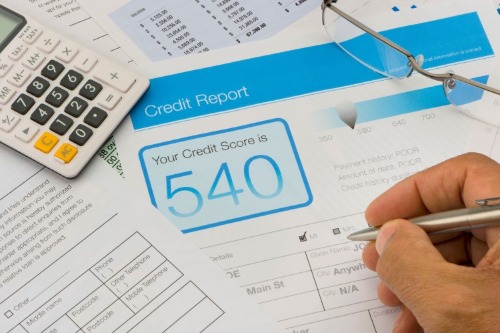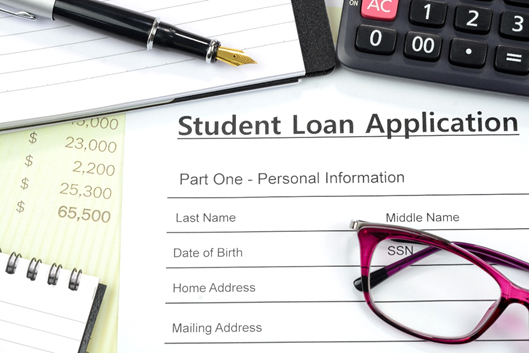Regularly checking on your credit history is essential to understanding your current financial health. It provides insights into how well you manage your debt and is a great way to know if you’re in a good position to borrow money. In addition, it also alerts you to fraud and helps you detect inaccurate information on your account.
Lenders may accept or deny your loan applications based on the information provided in your credit report and their own criteria. That’s why before you make big financial decisions like buying a house or a car, it is beneficial to obtain this free document.
How To Get a Free Credit Report
There are three major credit reporting bureaus in the United States: Equifax, Experian, and TransUnion. Fortunately, you are entitled to a free annual report from each of these agencies. The easiest way to request a copy is to visit AnnualCreditReport.com. You may also call (877) 322-8228 or download and complete the request form online before mailing it to:
Annual Credit Report Request Service
P.O. Box 105281
Atlanta, GA 30348-5281
If you wish to obtain all three reports at once, you can order each document separately. By doing this, you can better monitor your credit scores and history throughout the year. Once your free annual report from each agency is used up, they might charge up to $13.50 for subsequent requests.

What To Look For When You Receive Your Credit Report
The information contained in your credit report will help lenders determine whether to extend credit to you or not. Regularly monitoring your credit report status can improve your chances for loan approvals. However, with so many details listed in a single document, it can be overwhelming to review each of them. Here are some of the key points you should pay close attention to when inspecting your credit report:
Personal Information
Check if your credit report has an incorrect or incomplete name, address, or phone number. Multiple birth dates, the wrong social security number, and inaccurate employment information are also considered errors.
Accounts
This section comprises information on all of your credit accounts, such as credit cards, auto loans, and mortgages. Unrecognized accounts, inaccurate status of accounts, and incorrect credit limits are all bad news and should be verified.
Public Records
Lenders and other third parties will also inspect your public records for financial transactions like bankruptcies, foreclosures, and tax liens.
Inquiries
Reviewing your credit report will also help you detect if a company pulled your report without your permission or knowledge. This may mean that a fraudster applied for an account in your name.
Entrust Your Finances to Us
If you need help requesting a credit report, turn to us at 1st Community Credit Union. We take pride in delivering friendly and personalized service to our members. Contact us to get started on your journey to achieving financial independence.
Recently, the market has shown low numbers of new and used vehicles available for sale. This can be attributed to low-interest rates, consumers running on stimulus and tax refund money, and the pandemic’s uncertainty with supply chains, among other factors. If you are planning to shop for a new set of wheels, doing so can be a lot more challenging than usual. You might not find the car you want in your local dealership.
In addition, car prices are on the rise due to the downward trend of inventory numbers. To help you find the right vehicle, 1st Community Credit Union introduces AutoSMART.

What Is AutoSMART?
Although you may not find the car you want at your local dealership, the good news is that you can find and purchase at other stores through your computer or phone. AutoSMART offers a convenient way to help you find your next set of wheels. With this tool, you can search dealership inventories all over the country in the comfort of your home. This means you no longer have to drive to multiple car lots to look for a suitable auto.
How Does It Work?
With AutoSMART, finding the right car can be as easy as entering your zip code and selecting the type of vehicle you’re looking for. You can narrow down your choices by mileage, year, and price range using the tool’s search filters.
If you can’t see the automobile you want within 5 miles of your zip code, move the slider bar to widen to a full nationwide search. After that, you can sit back and browse the current inventory that matches your vehicle preference. Once you find a car you’re interested in and need more information on it, simply click the “Contact” button to send a message to the dealership where it is offered.
AutoSMART will also help estimate your monthly payments. You can also get your financing approved through this tool, so everything is taken care of when you walk on to the car lot to drive your new vehicle home.
Financing With 1st Community Credit Union
Purchasing a vehicle used to be an all-day activity. It’s a tedious process that starts with driving to your auto dealer, selecting a car you want, haggling over the price, and filling out a lot of paperwork. Then, you have to go back and forth between your dealer and credit union with your payment in hand.
To avoid that, 1st Community Credit Union and Credit Union Direct Lending (CUDL) collaborated to bring AutoSMART to improve your auto-buying experience. We made financing a car so much easier. You just have to decide on the make and model of the vehicle you want through the AutoSMART website. After that, simply visit the participating dealership where the vehicle is located.
Once you’re there, apply for 1st Community Credit Union’s low-rate auto financing through the CUDL system. You can get approved on the spot without needing to visit your credit union branch. All the paperwork is taken care of electronically, so all you have to do is drive your new car off the lot.
Drive Home Your Dream Car Today
If you’re planning to buy a car without all the hassle and stress that comes with the auto-buying experience, call us at 1st Community Credit Union in Wisconsin. Through our easy auto financing program, you can avoid the typical hassle of car buying and save that time for enjoying your new ride.
Are you dissatisfied with your current car loan? Perhaps it is time to talk with lending experts and start refinancing your car. The concept behind auto loan refinancing is straightforward: you take out a new loan to pay down the balance on your old one.

If you have trouble paying your bills because of an extremely high interest rate or monthly payment, refinancing may be the answer. Continue reading to decide if now is the right time to refinance your auto or recreational vehicle loan with 1st Community Credit Union.
If You Can Find a Better Interest Rate and Lower Monthly Payment
You should consider refinancing your car loan if you can find a deal that will reduce your interest rate. If you had no credit or low credit before, it is worth looking into refinancing your auto loan after a few years to see if you can get a better deal. Your credit score may have improved to the point where you are now eligible for a lower interest rate.
With a lower interest rate, you will be able to pay off your loan faster or lower your monthly payment while keeping the same repayment schedule. In either case, you’ll pay less over the loan’s life.
When Your Credit Score Has Improved
Like other loans in the markets, your credit score is also crucial when applying for a car loan. That is because auto lenders sort applicants by credit categories. If your credit ratings have improved since you purchased your last vehicle and you have made on-time monthly payments, you may qualify for a lower interest rate. Hence, a lower interest rate will save you money over the life of your loan.
Better credit scores can help lenders determine if you could pay off your loan. If so, they may offer you a lower rate. Having an improved credit score would be the perfect time to refinance your car loan.
When You Want To Extend the Auto Loan Term
An expensive event, such as having a baby, unanticipated medical bills, or a natural disaster, can force you to cut your regular expenses. For these reasons, you may choose to refinance your car and prolong the term of your loan.
Extending your loan term also means having a cheaper payment. Take note that your monthly payment is reduced when extending the length of your auto loan, but it also raises the amount of interest you’ll pay over time. It also works the other way around. So, if you shorten the period, your monthly payment will increase while your overall interest payment will decrease.
Contact Us for More Information About Car Refinancing
If you have more questions about refinancing your car loan, our local lending experts at 1st Community Credit Union in Wisconsin will be happy to assist you. We loan options that fit your budget. Apply now to get started!
Although everyone deserves a good education, most people don’t have the means to pay for it. That’s why they usually get a student loan to afford to enroll in a good college and pursue their studies. However, it could be a challenge to pay off student loans while managing your living expenses and saving for the future.

If you’re feeling overwhelmed by your expenses, here are a few tips you can follow to pay off your student loans faster and ease some burden off your shoulders:
Make Extra Payments the Right Way
One of the best ways to cut your total payoff time is to make larger payments. This will reduce the principal balance, shorten your loan period, and minimize the interest you have to pay. You can also make additional payments at any point in a month or every two weeks rather than waiting for the due date.
Just don’t forget to advise your service provider to apply the overpayments to your principal balance. Otherwise, you’re just advancing the due date and not paying off your loan faster.
Refinance if You Have Good Credit
If paying off student loans quickly seems impossible, you might be paying too much interest. To avoid this, consider refinancing multiple loans and replacing them with a single private loan with a lower interest rate. You can speed up the repayment by choosing a loan period that’s less than the remaining time of your current loans.
Opting for a shorter term will help you pay the debt quicker and save money on interest. However, it can increase your monthly payment.
Get a Part-Time Job While Attending College
One way to make sure you can get a head start on paying your loan is to have income. While attending college, try applying for a part-time job, so you can use your earnings to reduce your balance. However, you have to consider if you can properly manage your studies while working.
Follow a Budget
Being disciplined with your finances can help you pay off your student loan faster. If you understand your monthly cash flow and plan your expenses accordingly, you can prevent delays in reducing your principal balance. Make sure you’re diligent about sticking to a budget throughout your entire repayment period.
Stick to the Standard Repayment Plan
Although making additional payments is one of the best ways to shorten your loan period, some people cannot do it because of their financial situation. If you’re in a similar predicament, the fastest way to pay off your student loan is to follow the standard repayment plan.
Check for Interest Discounts
You’ll find that many people are struggling to pay off their student loans because of high-interest rates. Fortunately, some lenders can offer 0.25% to 0.5% discounts if you sign up for automatic payments on your loan. Other service providers may also offer discounts if you meet a certain number of on-time payments or if you apply for another loan with their company.
Planning to buy a new car or a used car is a big decision as it affects your monthly budget and financial situation. Purchasing a car might be one of your major financial commitments, needing you to figure out how it fits within your budget and whether it is affordable. Your budget dictates the price tag to the vehicle you can afford and not necessarily the car you want.
To illustrate, you want to buy a vehicle that costs $40,000/- but your income can only afford a car worth $25,000. Therefore, the car you want is not within your reach, thus, forcing you to reconsider your planned purchase. Non-payment of auto loan leads to your financier repossessing your vehicle. How can you calculate the amount you can afford to purchase your car?

1. Calculate Your Monthly Net Income
Financial advisers typically advise you to spend less than 10% to 15% of your monthly take-home income on your car loan payment. That means that your first step is to calculate your monthly net income against your monthly expenses. Doing so will help you determine how much extra income you can dedicate towards auto loan repayments and transport costs. Transport costs include fuel expenses, car service maintenance and repairs, and car insurance.
So, if your monthly net income is $4,000, plan to spend $400 on your car payment.
2. Check Your Credit Score
Your credit score contributes to determining your annual percentage rate (APR) payment on the auto loan. The higher your score, the less you pay for loan interests. Keep in mind that the interest rates for pre-owned vehicles are higher than interest rates for new cars. Be realistic about the length of time you wish to pay off your auto loan.
According to CNET, buyers in America negotiated to repay their car loans over long periods to make cheaper monthly payments. In March 2020, auto loan repayment periods were approximately 72 to 80 months of financing for new vehicles.
Negotiating for a longer-term repayment schedule reduces your monthly payments. However, the final amount of interest paid for your car increases.
3. Establish your Target Price
Once you have determined the amount of auto loan you can afford, set your target price for purchasing a vehicle. It is essential to factor in 10% for the sales taxes and fees. For example, your target price for buying a car is $ 25,000. At the dealer's, you see a car with the advertised price tag of $25,000. Calculate the cost of the vehicle to include an additional 10% to the advertised price to get the total purchasing price of $27,500, which stands above the price you can afford. Therefore, target a car whose price is approximately $22,500.
4. Make a Down Payment from Your Surplus Income
Make a down payment on your auto loan as it reduces the length of time to pay off the loan. You can use a trade-in as a down payment if you paid off your old car or you have equity.
For more financial advice for auto loans, contact 1st Community Credit Union or give us a call at 888-706-1228.
Eliminating your debt gives you more choices and allows you to take back control of your finances. However, getting out of debt is usually much easier said than done. It takes discipline and attention to detail, but it can be done if you create and follow a plan. Below are just a few ways you can start your journey to becoming debt free.

- Track your spending. If you don't know where your money is going, it's difficult, if not impossible, to eliminate excess spending and put that money towards paying off your debt. Take a good look at your spending by logging every dollar you spend for a couple of weeks. Then, take a good look at your log and see where you can make some positive changes. When you've identified those areas, make a monthly budget and vow to stick to it.
- Stop spending on credit. It may seem obvious, but you'll have a difficult time getting out of debt if you don't keep adding to the total. If you have little self control, you may want to cut up your cards or hide them in the freezer (where you can't use them until they thaw). It's not a good idea, however, to close your accounts as that can have a negative effect on your credit score.
- Eliminate excess spending. Most households spend money on things they don't really use. This could be subscriptions to online publications or streaming services that you rarely, if ever, use. According to a recent study by Waterstone Management Group, the average American household spends $237.33 a month on subscription services, including things like Netflix, Amazon Prime, a New York Time digital subscription or weekly food or beauty box. While these services can be convenient, they are usually charged automatically to your debit or credit account and can become a big draw on your finances over time if you aren't using all the services you pay for.
- Use the snowball method. Another popular method of paying off your debt is to use the "snowball" method. To do this, you pay the minimum payment on all of your debts except one, usually the one with the lowest balance. On that one, you pay at least double the minimum payment required. When you've paid off that bill, you move on to the next lowest, etc.
- Renegotiate your credit terms. Armed with your new budget and debt reduction plan, you may be able to renegotiate the terms of your existing debt. Banks and other lenders are generally willing to work with debtors to help them be able to pay back what they owe. This may lead to a lower interest rate, a reduction in the total debt or a longer period of time in which to pay the loan off.
1st Community Credit Union wants to help you manage your money more responsibly. We've been helping Wisconsin residents with their financial needs since 1961.
If you have been dreaming about spending your days camping, boating, or snowmobiling, you may be a good candidate for a recreational loan. Recreational vehicles can be expensive, but a recreational loan gives you the ability to purchase the vehicle you want on payments. Below are five things you should know about recreational loans before you sign on the dotted line.

- Recreational loans aren't just for RVs.
Even though recreational loans are often called RV loans, they can be used to finance many different types of vehicles. In addition to campers and motor homes, you can also use these loans to finance boats, ATVs, snowmobiles, scooters, personal watercraft and more.
- You can finance up to 100 percent of the cost of your recreational vehicle.
Most loans require you to pay a down payment at closing. However, when taking out a recreational loan, you can get funding for your entire purchase. This means you won't have to worry about saving up for a down payment before you can purchase your new vehicle.
- You can refinance existing recreational loans.
If you want to get better terms on an existing recreational loan, or if you want to give yourself more time to pay for your recreational vehicle, you can apply to refinance. At 1st Community Credit Union, we can help you refinance virtually any recreational loan.
- Terms of up to 10 years are available.
Unlike a standard auto loan, which is often capped at five or six years, recreational loan terms of up to 10 years are available on some loans (subject to restrictions). This gives you more time to pay the full balance of your purchase and lowers your monthly payment amount.
- You can get a preapproval.
It can be difficult to determine how much you can afford to spend on a recreational vehicle. With a preapproval, however, you will know the upper limit of your price range, making it much easier for you to find the perfect vehicle to purchase. In addition, a preapproval will speed up the process of closing the deal after you have found the vehicle you want to buy.
1st Community Credit Union is proud to offer recreational loans to clients purchasing any type of recreational vehicle, from snowmobiles to campers. Loan terms of up to ten years are available, depending on the specifics of your purchase. In addition, if you are a qualified borrower, we can finance up to 100 percent of your recreational vehicle's purchase price, so no down payment is required.
Are you ready to start shopping for the perfect recreational vehicle? 1st Community Credit Union offers free preapprovals. Please contact us today to get started or to learn more about our loans.
